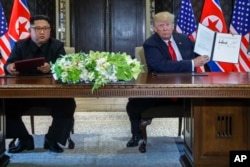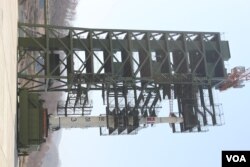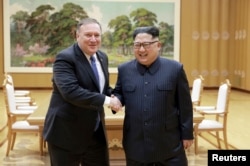A new book speculates about how war could begin again on the Korean peninsula. The central plot of the book talks about how renewed tensions involving North Korea and a deadly border incident could quickly escalate into nuclear war, due to political miscalculation, miscommunication and brinksmanship.
The new novel is titled, "The 2020 Commission Report on the North Korean Nuclear Attacks Against The United States," written by arms control expert Jeffrey Lewis, the director of the East Asia nonproliferation program at the Middlebury Institute of International Studies at Monterey in California.
It is a work of fiction that portrays what could happen if current diplomatic efforts to end the North Korean nuclear threat fail, and the U.S. resumes its maximum pressure campaign.
“It really was an opportunity to explain how crisis instability might play out in the Korean Peninsula in a way that is a bit more accessible than my academic work,” said Lewis.
The novel expounds on a hypothetical nuclear conflict scenario he wrote about last year in the Washington Post newspaper, and provides more fact-based background and detail to justify his assumptions. While a work of fiction, it incorporates likely actions and reactions by real leaders such as U.S. President Donald Trump, North Korean leader Kim Jong Un, and South Korean President Moon Jae-in.
Denuclearization skeptics
Lewis, like many North Korea analysts, is skeptical that Kim will unilaterally give up his nuclear and missile deterrent, despite the vague promises made at the Singapore Summit with Trump and the inter-Korean Summit with Moon. And he worries that what he sees as Washington’s unrealistic expectations for the North’s complete denuclearization will doom any hope for peaceful resolution to the threat of nuclear war.
“I have long thought that it is a mistake to focus heavily on the idea of disarmament, because it is not likely to happen and it distracts us from how important it is to reduce tension,” he said.
Denuclearization talks between Washington and Pyongyang have made little progress following the Singapore Summit, although satellite images released on Monday indicate North Korea has begun dismantling key facilities used to develop engines for ballistic missiles at its Sohae Satellite Launching Station. Trump had said Kim promised to dismantle the engine-testing site at the Singapore Summit in June.
Analysts say the goodwill gesture by the North will not significantly reduce its ability to conduct future tests from other launch sites or rebuild this facility in the future.
Rational restraint
Lewis’s novel presumes that diplomatic negotiations ultimately fail and the Trump administration again ramps up its military pressure tactics, including the resumption of joint military exercises with South Korea that Trump recently suspended, and flying U.S. fighter jets and bombers close to the inter-Korean border in a demonstration of military force.
In the novel, the heightened tensions caused by U.S. military pressure contribute in part to North Korea’s deadly overreaction to a border incident.
What is ominous is that at the early stages of the fictional crisis, leaders in Seoul and Washington respond with what they consider is restrained and proportional deadly force to punish Pyongyang’s aggression while trying not to escalate the conflict.
“There is a kind of, I think, naïve confidence about how easy it is to signal, when in fact we know in the real world that signals get crossed and that people misinterpret things,” said Lewis.
As the plot of the novel continues, Kim Jong Un, feeling his survival threatened, ultimately retaliates with nuclear attacks, first against South Korea, and Japan to deter an invasion, then targeting the U.S. mainland with intercontinental missiles. Missile defense systems deployed in South Korea, Japan and the United States prove inadequate to stop the large number of incoming ballistic missiles.
In this nuclear war scenario the United States prevails but at the cost of millions of lives, and catastrophic destruction in Asia and the United States.
Lewis’s cautionary tale is a reminder of the grave risks at stake if diplomatic talks with Pyongyang fail, and the dangerous consequences that could follow if Washington returns to military brinkmanship and threatening rhetoric in a renewed attempt to pressure North Korea to unilaterally disarm.











